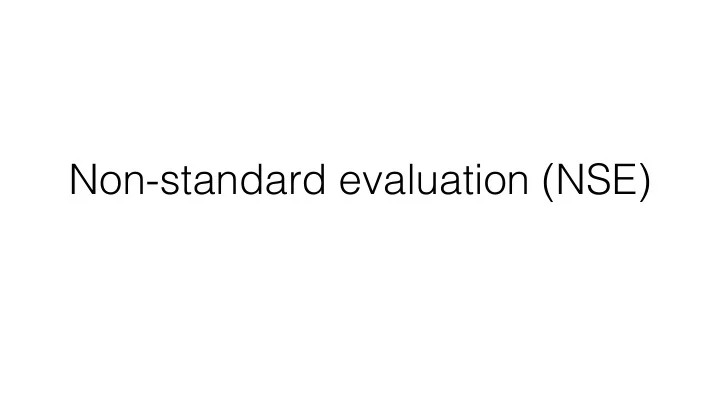

Non-standard evaluation (NSE)
An aside— how we used to learn R
An aside— how we used to learn R
"There are three kinds of language objects that are available for modification, calls, expressions, and functions." Some useful functions for computing on the language using base R: • quote() • enquote() • substitute() • deparse() • eval()
Call objects "sometimes referred to as “unevaluated expressions”, although this terminology is somewhat confusing" (thanks, R!) We can get a call object using the function quote() (not to be confused with a quoted string) > quote(2+2) 2 + 2 > "2+2" # just a character string [1] "2+2"
Call objects If you wanted to then evaluate a quote() ed call object, you could use eval() > eval(quote(2+2)) [1] 4 > eval("2+2") # there's nothing to evaluate here [1] "2+2"
Remember, R is lazy Sometimes, quote() doesn't give you exactly what you were expecting, because R is lazy. > a <- 1 > b <- 2 > quote(a + b) a + b
Remember, R is lazy This is where substitute() comes in. substitute() will substitute in the values it knows about in a particular environment. > substitute(a + b, env = .GlobalEnv) a + b > ?substitute "If it is an ordinary variable, its value is substituted, unless env is .GlobalEnv in which case the symbol is left unchanged."
Remember, R is lazy Okay… but environments are just lists! So we can make our own. > substitute(a + b, list(a = 1, b = 2)) 1 + 2 Of course, everything needs to be defined in that environment > substitute(a + b, list(a = 1, b = x)) Error: object 'x' not found > substitute(a + b, list(a = 1, b = quote(x))) 1 + x
Tidyverse NSE quo() is like quote() enquo() is like substitute() !! is like eval() ?
Where we’re going… I want you to create a new version of your bootstrap function, which works in the tidyverse. In other words, instead of calling bootstrap(mtcars$mpg, samples = 500) I want to be able to call mtcars %>% bootstrap(mpg, samples = 500)
Recommend
More recommend